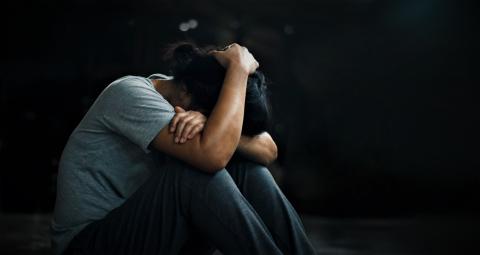“It is OK not to be OK”: We all are Simone Biles!

Patricio V Marquez
The international press has been abuzz these days with dispatches about Simone Biles, the US gymnast, seen as the world’s greatest, pulling out of one of the events in the Tokyo 2020 Olympics, citing mental stress. Just a month ago, Naomi Osaka, the second-ranked women’s tennis player in the world, also decided to quit the French Open, citing bouts of anxiety and depression. Bringing to bear his own struggles with mental illness, Michael Phelps, the most decorated Olympian of all time, offered support to Simone Biles by echoing Demi Lovato’s song 'It's Ok to Not Be Ok.' In an interview with NBC, where he is serving as a commentator on swimming at the Olympics, he observed,
“We’re humans. We’re human beings. Nobody is perfect, so yes, it’s OK to not be OK. It’s OK to go through ups and downs and emotional rollercoasters. But I think the biggest thing is we all need to ask for help sometimes, too, when we go through those times. For me, I can say personally it was something that was very challenging – it was hard for me to ask for help. I felt like i was carrying – as Simone said – the weight of the world on your shoulders. So yeah, it’s a tough situation”.
In the same manner as Michael Phelps, a lot of us who have gone through this type of “crises” remember well and can fully empathize with Simone Biles. Indeed, we feel what she is feeling now, as there have been days in our lives in which figuratively the sun did not shine, when we were surrounded by darkness, and when the motivation for doing things was simply gone. In my own case, while blessed with good physical health, at different points in my life I have succumbed to a sense of loss and detachment that has made me feel weak and incapable of facing the day, the week, or much less the future. These episodes often appeared in periods of transition, such as moving from high school to university, or times when I was separated from family working abroad, or when I experienced the loss of my father while living alone in Africa. With a telephone call, or later in life, when I was able to connect using Skype or FaceTime, I managed to reach out to loved ones, share the anguish that I felt at the moment, and little by little, with words of reassurance that everything was going to be all right and that things will get better the next day, I was able to step out of those invisible walls that were encircling me, casting a heavy shadow.
In the current times of COVID-19, many more people have experienced or are experiencing these episodes because our daily personal routines have been altered by social distancing measures needed to prevent the spread of the virus, impacting us in many different ways. The lack of interpersonal contact with loved ones and peers is contributing to feelings of isolation and loneliness; detachment from our communities is depressing us; and fear of becoming infected or of loved ones falling ill worries and makes us anxious. In large measure, a sense of being in “exile” has engulfed us as we drift through the sameness of days, feeling unmoored and uncertain about the repercussions of the pandemic. As if prophesizing our current times, Albert Camus, is his 1947 novel The Plague, a haunting tale of human resilience and hope, vividly describes similar feelings of entrapment experienced by the people in the Algerian city of Oran during a fictional, localized, outbreak of a lethal bubonic plague that forces the town authorities to mandate the closing of the city, preventing any contact with outsiders: “It was undoubtedly the feeling of exile—that sensation of a void within which never left us, the irrational longing to hark back to the past or else to speed up the march of time, and those keen shafts of memory that stung like fire.”
Given the intense disruption brought by COVID-19 to our everyday life, which has only compounded the pain among those with pre-existing mental and substance use disorders, it is of great importance to understand how the pandemic is affecting mental wellbeing and what can be done to help people cope and deal with its consequences in the short- and medium-terms. In doing so, we have to be mindful that this topic is not something that people like to talk about because it is uncomfortable or because most people do not know what it is like to experience these conditions. Unlike the manifestation of physical diseases, a depressed mood, loss of interest and enjoyment, poor concentration, constant anxiety, and reduced energy are typically not visible to others. As a result, the easy path for the affected is to retreat, to close up, to hide the anguish of not feeling well because we do not want to be embarrassed or be seen as weak or perceived as falling apart.
We also need to realize that while for many of us, feeling down, sad, or anxious represent transitory moments that can be managed with some effort and the help of loved ones and friends, or if required, with professional advice or some form of therapy, unfortunately, for those without access to health services or social support, severe depression and anxiety often translate into a life of misery, compounded by alcoholism and drug dependency, living with the terror of being discovered, fearing unemployment or loss of family—a situation that puts them at the margins of society and that could tragically end in suicide.
As documented by the World Health Organization (WHO), depressive and anxiety disorders are highly common across countries, impacting the mood or feelings of affected persons, with debilitating symptoms that range in severity (from mild to severe) and duration (from months to years) and that extract a terribly high social toll. These disorders, which are diagnosable health conditions, are distinct from feelings of sadness, stress, or fear that anyone can experience from time to time in their lives. Depression, in particular, is a major source of impairment and suffering in adolescence and is considered to be an important remediable risk factor for suicide, a leading cause of death among adolescents in many countries, including Japan, the host country of the Olympics. The findings of a recent systematic review and meta-analysis of 16 observational studies in 7 countries also found that mental disorders were associated with increased COVID-19 mortality according to both pooled crude and adjusted odds ratios; patients with severe mental health disorders had the highest odds ratios.
When expressing our solidarity with and sympathy for Simone Biles, let’s remember that none of us is immune to mental and substance use disorders, as they can and do affect people of all ages, from all walks of life, harming their health, functioning, and wellbeing. But more importantly, when thinking about “rebuilding our societies better” in a post-pandemic era, we need to openly discuss mental illnesses as normal expressions of human existence and cannot forget that the achievement of mental health parity in health care and social services provision should be a fundamental measure of effective health and social policy, planning, organization, and financial protection arrangements for people in need across the world.
Let’s hope that Biles’ experience, as well as those of other sports figures such as Osaka and Phelps, not only shines the spotlight on mental and substance use disorders, a seldom-discussed issue among athletes of their caliber, but helps push forward a committed and sustained effort to bring mental health “out of the shadows” into the core of the health and development agenda worldwide as it was advocated and called for at the 2016 World Bank Group-International Monetary Fund Spring Meetings.
Image Credit: ipopba. Stock photo ID:1051670638. Upload date: October 18, 2018
